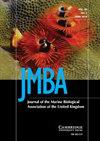Occurrence of the hydromedusa Moerisia cf. inkermanica (Hydrozoa, Moerisiidae) in the ballast water of oil tankers in the Gulf of Mexico
IF 0.9
4区 生物学
Q3 MARINE & FRESHWATER BIOLOGY
Journal of the Marine Biological Association of the United Kingdom
Pub Date : 2024-07-26
DOI:10.1017/s002531542400050x
引用次数: 0
Abstract
The introduction of non-native species is a constant concern around the world since it represents one of the main threats to biodiversity, impacting negatively on native populations, some of them with commercial importance. Hence, monitoring these introductions is fundamental to the management and conservation of the biodiversity of a region. Herein, we report the presence of墨西哥湾油轮压舱水中水螅虫 Moerisia cf. inkermanica(水螅虫,Moerisiidae)的出现
非本地物种的引入一直是全世界关注的问题,因为它是生物多样性的主要威胁之一,对本地种群造成了负面影响,其中一些种群还具有重要的商业价值。因此,监测这些引入物种对于管理和保护一个地区的生物多样性至关重要。在此,我们报告了在卡约阿卡斯石油码头装载石油的油轮压舱水中出现的墨鱼属(Moerisia cf. inkermanica)。由于缺乏全面的形态学描述和少量的分子数据,Moerisia 成员的分类尚不确定。因此,我们对其同属物种进行了详细的形态学比较。标本的分类学特征是根据触角周叶的长度、触角的数量及其线胞环的特征确定的。一些 Moerisids 被认为是世界不同地区的入侵物种。但多年来,墨西哥湾沿海生态系统中一直没有关于该属的报道。采样的油轮来自该地区的不同港口,主要来自墨西哥湾北部。因此,我们鼓励对这些生态系统进行系统监测,以确认该物种在该地区的入侵情况,了解其随着时间推移的种群动态,并评估其可能对本地种群造成的生态影响。
本文章由计算机程序翻译,如有差异,请以英文原文为准。
求助全文
约1分钟内获得全文
求助全文
来源期刊
CiteScore
2.30
自引率
8.30%
发文量
68
审稿时长
3-8 weeks
期刊介绍:
JMBA is an international journal, publishing original research on all aspects of marine biology. It includes pioneering work taking place today on major issues concerning marine organisms and their environment. Subjects covered include: ecological surveys and population studies of marine communities; physiology and experimental biology; taxonomy, morphology and life history of marine animals and plants; and chemical and physical oceanographic work. Included with 2010 online subscriptions: Marine Biodiversity Records.

 求助内容:
求助内容: 应助结果提醒方式:
应助结果提醒方式:


